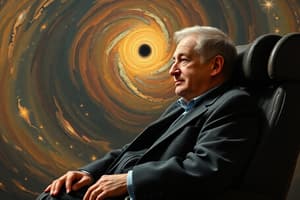Podcast
Questions and Answers
According to Aquinas' teleological argument, why does he believe that an intelligent being is required to bring final purpose to non-intelligent entities in the universe?
According to Aquinas' teleological argument, why does he believe that an intelligent being is required to bring final purpose to non-intelligent entities in the universe?
- Because non-intelligent entities lack the ability to change their behavior to support human life.
- Because non-intelligent entities have no awareness of human life.
- Because non-intelligent entities cannot choose to produce support for human life on their own. (correct)
- Because non-intelligent entities are incapable of adapting to the needs of human life.
In Paley's Watch Analogy, what does he use the example of the watch to illustrate?
In Paley's Watch Analogy, what does he use the example of the watch to illustrate?
- The inevitability of complex objects evolving from natural events.
- The need for intelligent design in the creation of complex objects. (correct)
- The randomness of natural events in the creation of complex objects.
- The limitations of human understanding when observing complex objects.
How does Paley address natural evil in his teleological argument?
How does Paley address natural evil in his teleological argument?
- By proposing that natural evil is a sign of the absence of an intelligent designer.
- By suggesting that natural evil is necessary for the development and growth of human life.
- By asserting that even if the world does not completely work properly, it still requires a designer. (correct)
- By emphasizing that natural evil is a result of flaws in the design of the world.
According to Tennant, why does the appreciation of beauty in humanity suggest the existence of an intelligent designer?
According to Tennant, why does the appreciation of beauty in humanity suggest the existence of an intelligent designer?
What is Hume's objection known as the 'Fallacy of Composition' in the context of the cosmological argument?
What is Hume's objection known as the 'Fallacy of Composition' in the context of the cosmological argument?
What does Hume's objection about 'Meaningfulness' suggest in relation to humanity's knowledge about the creation of the universe?
What does Hume's objection about 'Meaningfulness' suggest in relation to humanity's knowledge about the creation of the universe?
According to Chaos Theory, what is the nature of atomic particle movement?
According to Chaos Theory, what is the nature of atomic particle movement?
What does Hume's criticism about using human analogies to prove the teleological argument suggest?
What does Hume's criticism about using human analogies to prove the teleological argument suggest?
How does the 'Big Bang Theory' challenge inductive arguments for the existence of God?
How does the 'Big Bang Theory' challenge inductive arguments for the existence of God?
What is the main difference between the cosmological argument and the teleological argument?
What is the main difference between the cosmological argument and the teleological argument?
Which type of teleological argument is associated with the idea that the world/universe is too ordered/regulated to have come about by chance?
Which type of teleological argument is associated with the idea that the world/universe is too ordered/regulated to have come about by chance?
What is the main idea behind the second type of teleological argument, Design Qua Purpose?
What is the main idea behind the second type of teleological argument, Design Qua Purpose?
What did Paley argue about the complex design in nature?
What did Paley argue about the complex design in nature?
What does Tennant's Anthropic Principle suggest about the universe?
What does Tennant's Anthropic Principle suggest about the universe?
What is the significance of Tennant's Aesthetic Principle in relation to creation?
What is the significance of Tennant's Aesthetic Principle in relation to creation?
What does Arthur Brown use as evidence of order/regularity in nature in his modern take of the teleological argument?
What does Arthur Brown use as evidence of order/regularity in nature in his modern take of the teleological argument?
Which modern scientific criticism potentially supports Hume's first criticism of the cosmological argument?
Which modern scientific criticism potentially supports Hume's first criticism of the cosmological argument?
In Michael Denton's modern version of the teleological argument, what does he deduce as far too complex to have just evolved?
In Michael Denton's modern version of the teleological argument, what does he deduce as far too complex to have just evolved?
Which criticism of the teleological argument potentially supports Hume’s second criticism?
Which criticism of the teleological argument potentially supports Hume’s second criticism?
According to Hume's first criticism of the teleological argument, why does he reject the use of human-based analogies like houses and watches?
According to Hume's first criticism of the teleological argument, why does he reject the use of human-based analogies like houses and watches?
What ancient argument does Hume refer to when he argues that the universe may be in chaos and not necessarily designed?
What ancient argument does Hume refer to when he argues that the universe may be in chaos and not necessarily designed?
What is Hume's main objection to the cosmological argument's assertion that 'the first causer must be God'?
What is Hume's main objection to the cosmological argument's assertion that 'the first causer must be God'?
According to Stephen Hawking's explanation in the 'Grand Design', why is it not necessary to create a God for the big bang?
According to Stephen Hawking's explanation in the 'Grand Design', why is it not necessary to create a God for the big bang?
How does Charles Darwin's theory of evolution challenge the teleological argument?
How does Charles Darwin's theory of evolution challenge the teleological argument?
What is one of the strengths of inductive arguments, such as the cosmological and teleological arguments?
What is one of the strengths of inductive arguments, such as the cosmological and teleological arguments?





